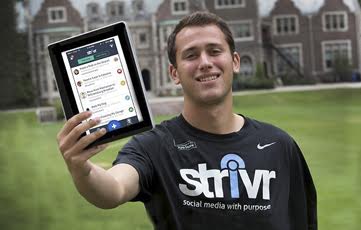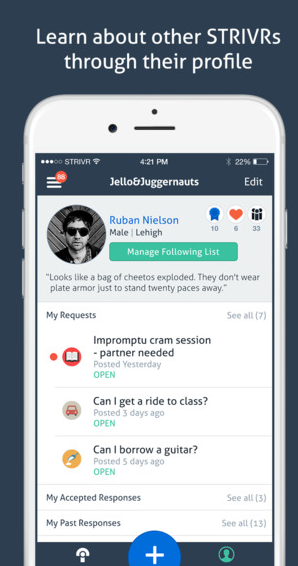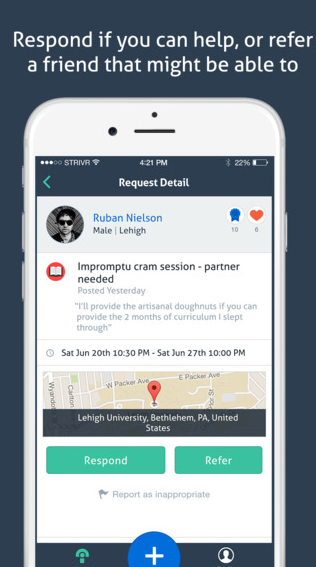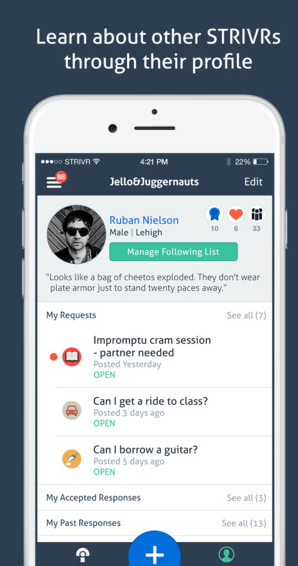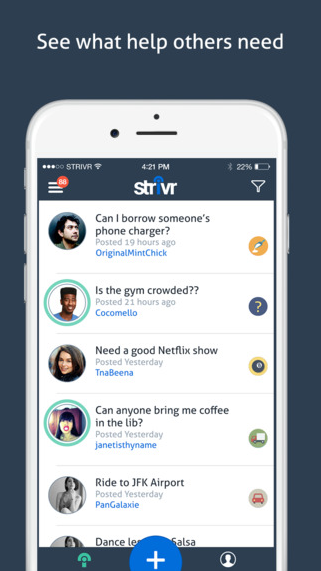If you want help, just post about it on new app Strivr
By: Cari Zahn – Staff Writer
How many times have you been sitting in the library, finally able to focus, when your phone or computer starts to die and you have to go home for your charger and break your perfect concentration? Have you ever really needed a ride somewhere, but have been too afraid to ask a friend out of fear that they’ll feel obligated say yes, even if they didn’t really want to? What about desperately needing a cup of coffee while working at your on-campus job that you can’t leave?
Strivr, an innovative mobile app for college students, has just launched for the University of Dayton and contains the solution to all of the above problems and more. Students in different campus communities are using the app to get help with assignments, borrow chargers or textbooks, and ask for Netflix recommendations, but the possibilities don’t stop there. Some requests may seem like a long shot, but with 90 percent of the requests on Strivr met with help, there’s not much room to feel hopeless.
“I’ve seen someone on the app ask to borrow a waffle maker, and he actually got one dropped off to him,” Zach Gray, creator of Strivr, said.
Gray had the idea for Strivr when he was a first year at Lehigh University. Initially, he noticed that whenever he was in a group text and he or one of his friends would ask a question, it would often get lost in the noise of the jokes and other conversation going on. Additionally, Gray discerned how people often felt bad asking for favors, and after some research, found that 70 percent of people don’t ask for the help they need.
His solution was Strivr. Gray wanted to create a social media platform that was a comfortable place for people to ask their friends and community members for help. His goal was to eliminate the downsides of asking for help by targeting a relevant and willing audience and adding several features to ensure the interaction was as successful as possible.
The app operates on a location-based feed, so that requests from your school are displayed. App users can create a profile and follow their friends so a notification is sent to their phone whenever their friends post asking for help. In that sense, when you ask for help in the group, you are asking your friends directly. But other willing members of your community can also see the request and reply or offer help.
To post a request, users can choose from several categories in which their posts fit best, such as borrowing, delivery or rides. From there, each category has different features that add to the experience and help personalize requests and make them as easy to carry out as possible.
Another feature allows Strivr users to proactively offer help. If you’re going for an afternoon Starbucks fix, why not log on and see if anyone else wants something while you’re out? This feature emphasizes that the Strivr community is full of people who are willing to help you just to make your life a little easier.
“Since launch, there has been over twice as many offers to help as their have been requests for help,” Gray said. “It proves the point that if you want help, you just have to ask for it.”
Gray wants Strivr to spread the message that it’s OK to ask for help by setting up a social media platform full of people who are willing. There is no reason to be scared to ask with Strivr because you can rest assured there is someone out there who really wants to help you and isn’t obligated to. And in many cases, whatever they offer to help you with would be very easy for them to do anyway.
Strivr was only at a few schools when it launched in September 2014, but it is currently at 50—and that number is expected to increase to 75 by the end of the semester. According to Gray, Strivr is a great way to build community on campus by providing students with a way to interact with people that may have never interacted with otherwise. It emphasizes the fact that on campus, someone always has your back in one way or another. This message is no stranger to UD students, who value the tight-knit community of our campus.
At the end of the day, the app gives users a way to pay kindness forward and show members of their community that they are never without a support system, even for something small like a coffee. At UD, that kind of community is what we’re all about.

